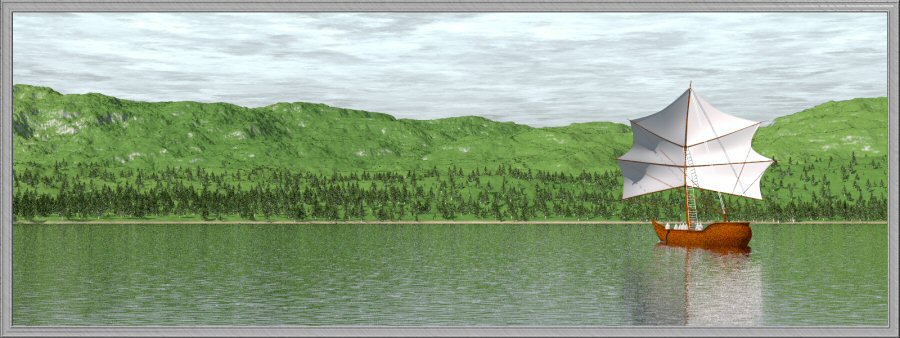The Heretics
The history of the Ell, to some, is the history of the Lie. In every generation, despite all that they are told, there are always a few that look for their answers elsewhere, seeking knowledge of the Creator by less well-travelled roads. But they are ever denied by those that order the world, and even punished for daring to look outside their carefully prescribed bounds. The Velukor is the light, chosen of the Creator, they are told, look no further! And yet, for whatever reason, still they disbelieve it.
There will always be those that disagree; but in a unified world, those that preach the doctrines of discord cannot be allowed to remain. You have rejected paradise, they are told, therefore you cannot live within it. But how can you know what it is that you have if there is nothing to compare it with, cry the accused, are not all things made known by their opposite? Indeed they are, comes the answer, and that is why you must leave. Into exile you must go, never to return, you and all your children unto the last generation, dishonoured, disinherited, never again to live in the light, for, by your very own words, you have denied the true light, and have become that which shall define the rest of us from this time forward, a permanent reminder of the path that we should always take.
And how did it come to this? The beginnings lie far back, during the last years of the Wars of Unification, when the last of the Iabeiorith fled their few remaining lands and went willingly into exile. They made their weary way to Lon-Gohed – a lonely land set far to the south – there to escape the wars in the North and find peace at last. So, to bring about an end to war and complete the acts of unification, Anolei, seventh of the line of Karmaraa, conceived the articles of separation, the Logah Siatris, and by its word peace would return to the world. But the price of that peace was to be the practice of exile, and so Lon-Gohed became Lonsiatris, the place of exile.
Thus the line was drawn. Accept the world as it now was, or accept exile. Most kept quiet, happy to dwell within their given bounds, but not all. To every generation came those willing to question, daring even to speak out. And there were many writings, both open and secret, spreading the words of discontent, ever asking why such boundaries must exist, why everything must remain locked in its place. The Balt Kaalith, those that kept the order of the world, suppressed such works as best they could, but it was like fighting the great ocean itself.
First amongst equals was the Logah Sibald, a text that stubbornly refused to die. Many read it in wonder, and were, for a time, beguiled by its promise. A few went further, openly espousing its message, but they paid for their rashness with their freedom. And if they did not recant? With their lives. For the Balt Kaalith became ever more merciless in their pursuit of what they considered to be heresy, and as time went on, so the angrier they became, guardians of a paradise that never was.
The Logah Sibald espoused self-knowledge as the way to know the true intent of the Creator. It said that as we opened up our knowledge of the world, so we opened up our knowledge of ourselves. It also spoke of a hidden order, a secret sodality with more than common understanding, by name called the Nafith. But the Nafith did not exist. They were an idealised creation, a wish for something better, and those who read the Logah Sibald with open eyes understood this. But the Balt Kaalith never did, and wasted much time looking for the wrong thing.
The Nafith were said to have attained a greater enlightenment, a purity of spirit unequalled by any other, and that, because of this, they were no longer visible to mortal sight. The Balt Kaalith took this literally, but ascribed darker purposes to such claims, that of sorcery, and the influence of the Mahorelah. It all finally came to head during the reign of Milages, the twenty first Velukor, when a noted thinker and philosopher by name of Baaok of the Salman Detex, talked openly of his interest in the Logah Sibald and its tale of the Nafith. He was detained and interrogated by the Balt Kaalith, for they came to believe that he was a member of this coven of invisibles. Not understanding his peril, he sat before them with a lighter heart than he should have, telling them that he could not possibly be one of the so-called Nafith as he was clearly not invisible.
The jest fell upon deaf ears, and Baaok was exiled. After that, all mention of the Logah Sibald vanished. But it continued in secret, a gentle provocation intended to make its reader think, that the path laid out before them led to only one thing. Stagnation! This far and no further! The Balt Kaalith, by such ruthless suppression, had created the very thing they sought to root out. Having convinced themselves that they were looking for conspiracy, they made it so. In the Nafith they saw an enemy that had to be defeated, for in their minds they imagined sorcery, demons, the re-emergence of the influence of the Mahorelah. But the monsters of their minds did not exist. That horror lay elsewhere, and when it finally arrived, they found themselves ill-prepared for it.
